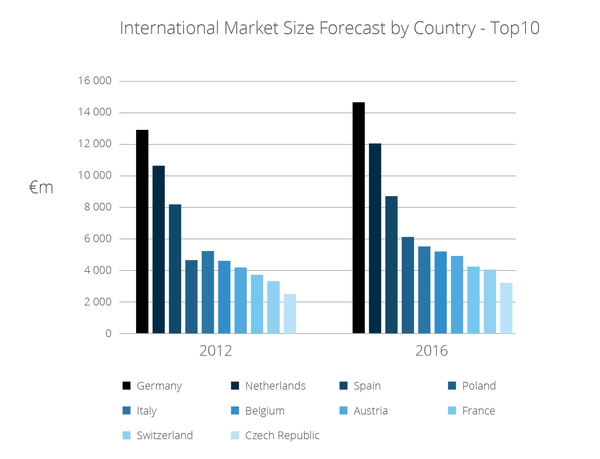Freight exchanges changed the face of the European transport, freight forwarding and logistics sector in just a few years. During that time, thousands of companies have made the exchanges their primary source of obtaining orders, modernising the existing business model. Still – have these changes in fact brought any real benefits?
The popularity of freight exchanges continues to grow. This is mainly due to the fact that those provide their users the possibility of establishing cooperation with thousands of customers all over Europe.
Looking at the statistics, the international road freight transport market grows steadily since 2010. Moreover, according to the forecasts of Transportation Intelligence, it will continue to grow 3.8% a year until 2016, allowing for the dynamic development of many entities in the transport, freight forwarding and logistics sector. In this context, one can assume a positive relationship between the growing number of entities using the exchanges and the development of the transport market, indicates Michèle Panek, Western Group Sales Team Manager at Trans.eu BVBA.

The benefits of freight exchange
International orders equal higher rates than those in the domestic scope. Therefore, the carriers tend to use them willingly. Up until now they frequently encountered problematic barriers, such as foreign language, ignorance of the law in the country of the contracting party or the difficulty in finding the orders. Now, thanks to the exchange operators and transport platforms offered by them, the entrepreneur receives comprehensive support, enabling it to easily find the load or vehicle, and – what is very important – to verify the credibility of the counterparty, which they want to cooperate with. Moreover, the very conclusion of order and the exchange of documents is much faster and easier.
An important advantage of exchanges is also the diversity of sources of transport orders. Once companies used to rely almost exclusively on long-term relationships with selected entities. This was, of course, advantageous, since the counterparty was verified and thus reliable, but often more expensive as well, and it did not solve the issue of returns with empty trailers. A large number of offers available on the market from various entities not only creates the opportunity to select the best offer, also in terms of expenses, but reduces the fear of returning with an empty trailer as well.
Naturally, long-term relationships are worth establishing, but considering the business assumptions, it is advisable, and even necessary to verify whether the counterparty’s offer is not exorbitant. The exchange is perfect in this respect, because it provides a point of reference and a room for negotiation. At the same time it allows for a verification of the partner – through opinions and comments about it, and, if necessary, allows for a quick establishing of a cooperation with another carrier or freight forwarder, indicates Michèle Panek, Western Group Sales Team Manager at Trans.eu BVBA.
The emergence of exchanges and the possibility of acquiring partners through them has been particularly beneficial to small and medium-sized companies. Now, due to the general availability of offers, they may compete, to some extent even with the imprtant players of the industry, and through winning positive feedback or certificates granted by the operators, build their own brand and certify the quality of services rendered.
Increased competition
Popularity of freight exchanges naturally tightened competition in the road transport sector. An increase in the number of active entities affected the rate level for 1 km, especially in the domestic transport. However, from the macroeconomic perspective it also brought positive effects, explains Michèle Panek, Western Group Sales Team Manager at Trans.eu BVBA.

It is compensated even by the savings from reducing courses made with empty trailer. And there is more to it, the forecasts for this specific market indicate that in 2016 it will be almost 10% larger compared to 2012.”
Taking into account the effects of the popularisation of freight exchanges, it must be certainly recognised that their impact on the development of the transport, freight forwarding and logistics sector is positive. This applies in particular to enhancing the security of cooperation, cost optimisation, activation of smaller entities and the ease of establishing new international relations. Each change, especially such a big one, introduces new problems and concerns as well; however, its benefits serve as a good motivation to overcome emerging obstacles.

